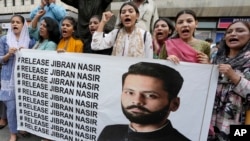A prominent Pakistani lawyer and human rights activist returned home late Friday, a day after armed men allegedly abducted him from near his residence in the southern port city of Karachi.
Local police officials and relatives confirmed that Jibran Nasir had rejoined his family but shared no further details.
Nasir said on Twitter that he had "returned home safely with the prayers and efforts" of all his friends and colleagues. "I remain determined, and the struggle will continue," the activist wrote in Urdu.
Nasir and his wife, Mansha Pasha, were returning home just before midnight on Thursday when two vehicles intercepted their car in an upscale neighborhood and took him away.
Pasha filed a police complaint early Friday demanding "immediate action" for Nasir's release and against those behind his abduction. She did not blame anyone, nor has any group claimed responsibility.
"Some 15 people, along with weapons, came out from the vehicles in civil clothes and forced my husband to get out of the car, manhandling him towards the subject vehicle," Pasha stated in her complaint.
Police said an investigation was underway into the incident.
Nasir's disappearance outraged local and international rights groups. Human rights activists, journalists and lawyers protested his abduction in Karachi on Friday.
The independent Human Rights Commission of Pakistan, or HRCP, said it was "deeply concerned that unknown men had abducted the lawyer and activist.
"We demand that he be safely recovered immediately, and his abductors held accountable under the law," the watchdog group said.
Nasir is a vocal critic of human rights abuses in Pakistan and actively pursues cases of minority communities.
In recent weeks, he has increasingly criticized a nationwide government crackdown on supporters of former Prime Minister Imran Khan's opposition Pakistan Tehreek-e-Insaf, or PTI, party. Nasir has accused the powerful military of being behind it.
"Jibran Nasir's abduction is yet another case that the country has seen in recent weeks in the wake of authorities cracking down on critical voices following violent clashes during Imran Khan's arrest," Amnesty International said.
Khan denounced the abduction of the activist.
"Today, the oppression and repression of all martial laws have been surpassed. There's a complete crackdown on PTI plus anyone who dares to criticize the blatant violations of all fundamental rights of our citizens," the opposition leader said on Twitter.
The PTI chief, who remains the most popular politician in Pakistan, according to public opinion surveys, was arrested by paramilitary forces on May 9 on corruption charges. His detention sparked nationwide protests, with protesters in some cases attacking public and military property.
Pakistan's Supreme Court outlawed Khan's arrest two days later, but Prime Minister Shehbaz Sharif's coalition government has since unleashed a crackdown on PTI leaders and supporters.
Khan says police have arrested more than 10,000 PTI members, including senior party leaders. He has accused the military of being behind the dismantling of his party, the country's largest.
The government has acknowledged the detentions, saying those involved in attacks on public property will be tried in anti-terrorism courts while others will face trials in military courts.
In recent days scores of senior PTI leaders have either abandoned Khan or politics altogether, citing attacks on military installations during protests over his arrest. Those doing so are being released from jail, while others refusing to quit the PTI are being threatened with prosecution in military courts.
"People leave jail, hold a press conference, condemn the incidents of arson, and announce quitting the party. Even if you have not been subjected to physical coercion or pressure, this is not something that's being done voluntarily," said Hina Jilani, the head of the HRCP.
Police have already handed over several dozen PTI supporters to the army for trial in military tribunals. The move has outraged local and international rights defenders who maintain that trying civilians in military courts is a breach of Pakistan's international obligations and human rights law.




